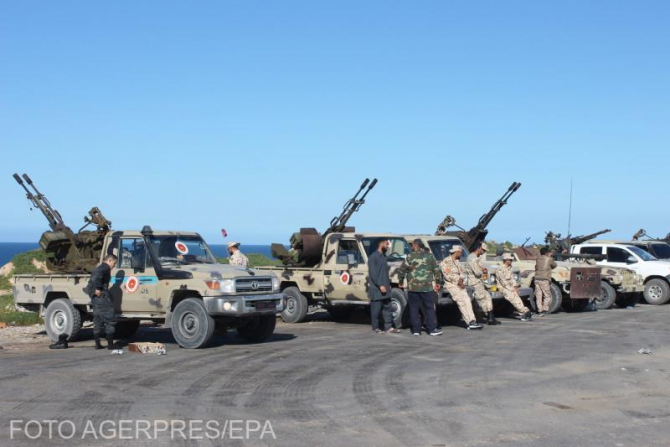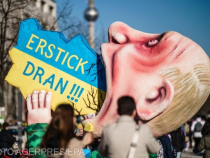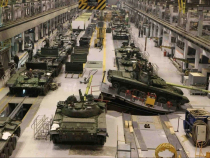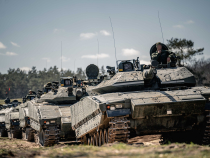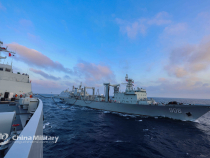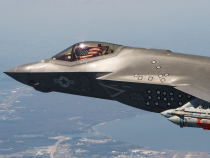Una dintre țările cele mai stabile din punct de vedere social pe timpul dictaturii lui Ghadafi, Libia de astăzi cunoaște scenariul negru al războiului civil.
Un fost general al armatei regulare libiene, Khalifa Haftar a recâștigat prin lupte majoritatea teritoriului libian, astăzi el fiind la poțile capitalei Tripoli, devenită un câmp de ruine in ultimii ani. Complexitatea intereselor arabe, europene și americane în Libia, analizate prin prisma unui stat primordial ca importanță în istoria acestei națiuni, devine iată o necesară publicare.
ASRIE, prin analiza lui Giovani Giacalone, publicată la secțiunea FOCUS LIBYA, propune cititorilor DefenseRomania o lectură pasionantă despre interese economice, dezastre ideologice și resurecția unei națiuni.
The hazardous choice of supporting Fayez al-Serraj
On June 18th Gen. Khalifa Haftar’s airforce raided a Mellitah Oil and Gas storage, owned by the Italian company ENI and by the Libyan NOC. According to the Libyan National Army, the site was targeted because the militias loyal to Fayez al-Serraj had stored weapons inside. Indeed, Tripoli’s side is claiming that there were no weapons and that Haftar’s attack is an illegitimate act of prevarication. However the real meaning of such act is clear: the war is far from over and the current deadlock between the two fighting sides is just temporary as they are both stocking supplies for the next offensive.
As to al-Serraj’s militias, they can clearly count on Qatar’s financial support and Turkey’s backing regarding weapons and military vehicles being shipped to the ports of Tripoli and Misrata, such as the ones documented on May 28th. In addition, the LNA accused Turkey of sending military advisors to train the pro-Serraj militias.
Regarding Europe, even if from Brussels the line is to safeguard dialogue between Serraj and Haftar in order to reach a political solution, it is easier said than done as not only the two fighting parts seem far away from a potential deal, but it is also important to keep in mind that each country has its own agenda.
As to Italy’s position, it is evident how Rome had an interest in backing Fayez al-Serraj and Tripoli’s government and that is due to several factors such protecting the Greenstream gas pipeline; receiving help from the local militias in order to limit the massive immigration flow from the ports of western Libya; closing the deal for the construction of Tripoli’s international airport, which will be carried out by the Aeneas consortium, together with a group of local companies. [1] In addition, it is also important to recall that Italy maintains a hospital in the strategic port city of Misrata.
The support received by Tripoli is a heritage of the two previous Italian governments that were led by Matteo Renzi and Paolo Gentiloni and in that phase it might have even made sense. Although things in the Middle East and North Africa change quickly, especially after the so-called Arab Springs that began in 2011.
The Libyan situation quickly evolved to the point where taking the side of Fayez al-Serraj is swiftly becoming uncomfortable, inconvenient and even hazardous to some extent.
First of all it is important to keep in mind that al-Serraj does not have the support of a real army and, even if this is also true for Haftar’s LNA, as they both embed different armed groups, in Tripoli’s case the situation is far more complex as its forces are composed by a galaxy of different militias that include local warlords, Islamists linked to the Muslim Brotherhood, Salafis, former members of the Libyan army, revolutionaries.
Such militant groups are held together by two main key-factors: economic/political interest and the war against their common enemy, General Haftar.
Throughout time, the various militia leaders have managed to establish deep roots in the territory, dividing it into small feuds and setting up a series of activities that guarantee their income. A mechanism that is based on a faltering oligopoly that influences every aspect of life in western Libya, from government management to the control of banks; from the black market to the security of oil facilities.
Additionally, it is important to examine if it is really al-Serraj who is in control of the militias, or if it is rather the other way around. After all his personal security and the functioning of the government is guaranteed by the militias themselves, something that the European governments are well aware of.
Such militias are very unpopular even among many armed groups formed on the basis of local communities back in the 2011 war against Gaddafi, as exposed in the Washington Post by analyst Wolfram Lacher:
“Over the past three years, most members of such armed groups watched with disgust as militias tussled over control of state institutions in Tripoli. A handful of militias established a virtual cartel that oversaw the pillage of state coffers, to the benefit of a small circle of politicians, businessmen and militia leaders. But few were prepared to confront these militias. Last year, some politicians and militia leaders from western Libyan cities tried for months to mobilize support for an offensive against the Tripoli militias”. [2]
Furthermore, there is an element of extreme concern that has to do with the presence of Islamist and jihadist groups linked to the Muslim Brotherhood, to al-Qaeda and ISIS, all embedded in Fayez al-Serraj’s militias, as illustrated by a recent article published by “Speciale Libia” which exposed the presence, among Tripoli’s militias, of Adel al-Rubaie (member of the Shura of the Mujahideen and Ansar al-Sharia) as well as Issa al-Busti (known for taking part in terror attacks perpetrated by Ansar al-Sharia in the Cyrenaica) and Massoud al-Akouri. [3]
It is also important to recall the killing of Mohamed Mohamed Mahmoud Ben Dardaf, which occurred at the end of May 2019 during clashes between al-Serraj’s militias and Haftar’s forces. Ben Dardaf, who was a member of the Somoud brigade, was wanted by Eastern Libya in relation to the attack against the US consulate in Benghazi that took place on the night between September 11th and 12th 2011, when a group of jihadists murdered US ambassador Chris Stevens.
Considering the facts exposed above, it is quite difficult to provide support for Fayez al-Serraj’s side, simply because its “side” is composed by a wobbly group of militias that cannot guarantee any type of stability as they are kept together by limited economic interests. In addition, such militias have a strong Islamist and jihadist component and it would be unthinkable to undertake a path leading to a politically legitimization of such parts; especially after the Muslim Brotherhood’s big political fiasco that brought the Islamist organization from being a political force of reference to a banned extremist group.
Furthermore, is Turkey and Qatar’s support for Tripoli and Misrata going to last for much longer? Maybe in the short-medium term it will continue, but let’s not forget that Erdogan has some serious internal issues to deal with, including the loss of Istanbul by AKP and the situation in north-western Syria that is becoming problematic as Assad’s troops are gaining ground.
In conclusion, the support for the militias backing al-Serraj may not be the best option on the medium-long term and the Italian government might find useful to carefully ponder the decisions to take in the Libyan scenario.
Giovanni Giacalone is a senior analyst for the Italian Team for Security, Terroristic Issues and Managing Emergencies (ITSTIME) in Milan’s Catholic University and a contributor for Il Giornale/Inside Over.
Notes: [1] https://quifinanza.it/finanza/tripoli-al-via-lavori-dellaeroporto/211847/
[2]https://www.washingtonpost.com/politics/2019/04/10/think-libyas-warring-factions-are-only-it-money-think-again/?utm_term=.bb1ac31a9c7f
[3] https://specialelibia.it/2019/06/17/tripoli-la-proposta-disperata-di-serraj-mentre-tra-le-sue-milizie-spuntano-nuovi-terroristi/
DefenseRomania App
Fii primul care află cele mai importante știri din domeniu cu aplicația DefenseRomania. Downloadează aplicația DefenseRomania de pe telefonul tău Android (Magazin Play) sau iOS (App Store) și ești la un click distanță de noi în permanență
Fiți la curent cu ultimele noutăți. Urmăriți DefenseRomania și pe Google News
